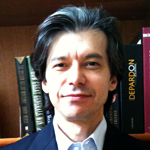Azad Bonni, MD, PhD, currently professor of neurobiology at Harvard Medical School, will be the next head of the Department of Anatomy and Neurobiology at Washington University School of Medicine in St. Louis.

Bonni becomes the Edison Professor and head of Anatomy and Neurobiology in October 2012. Larry J. Shapiro, MD, executive vice chancellor for medical affairs and dean of the School of Medicine, made the announcement.
“The Department of Anatomy and Neurobiology has a very distinguished history of leadership and innovation in its field,” Shapiro says. “We are confident that Dr. Bonni, who has produced many remarkable insights into brain development, will support and expand those traditions.”
Bonni studies how the brain is built at the level of individual connections between nerve cells. Key areas of his research include studies of the mechanisms that regulate the development of nerve cells and their ability to connect with each other in the brain. His lab is currently focused on the role of transcriptional and ubiquitin signaling in these processes. He also investigates how those mechanisms can contribute to neurological diseases when they go awry.
“The opportunity to lead the Department of Anatomy and Neurobiology at Washington University School of Medicine is a great honor,” Bonni says. “Research at Washington University has had a lasting impact in the establishment of neuroscience as a discipline, and the Department of Anatomy and Neurobiology has played a central role.”
Previous heads of the department have included founding head Robert J. Terry, MD; Edward W. Dempsey, PhD, who went on to serve as dean of the School of Medicine; W. Maxwell Cowan, MD, DPhil, who later became vice president and chief scientific officer of the Howard Hughes Medical Institute; and Gerald D. Fischbach, MD, who later became director of the National Institute of Neurological Disorders and Strokes.
The current department head, David Van Essen, PhD, is a past president of the Society for Neuroscience. He will continue as professor of anatomy and neurobiology and lead researcher for the Human Connectome Project, a multi-institutional effort to generate a first-of-its-kind map of all the major circuits in the human brain.
“I am extremely pleased that Dr. Bonni has agreed to take on the leadership of our department,” Van Essen says. “He has an exciting vision for the future of the department and for new collaborative opportunities with other departments, and I look forward to a smooth transition as we pass the leadership reins.”
Bonni earned a medical degree in 1986 from Queen’s University in Kingston, Canada. He specialized in neurology at McGill University and became chief neurology resident at the Montreal Neurological Institute in 1990. Bonni earned a doctorate in neuroscience at Harvard University in 1996 and launched his own laboratory at Harvard Medical School in 1999, where he rose to the rank of professor in 2008. Bonni is the recipient of many honors and awards, including the Robert H. Ebert Clinical Scholar Award from the Esther A. and Joseph Klingenstein Fund, the Alfred P. Sloan Foundation Award, and the Sidney Kimmel Scholar Award.
“I envision that the major research goal of the department moving forward will be to gain a deep mechanistic understanding of brain development and function with an emphasis on mechanisms that govern neural circuit assembly and activity,” Bonni says. “Drawing on the basic science core strengths of the department, another major goal will be to apply advances in the basic biology of brain development and function toward a better understanding of neurological and psychiatric disorders.”
Bonni said he hopes to make autism spectrum disorders and intellectual disability a focus of the department in the future. He says an essential step toward this goal will be to support and expand the Department of Anatomy and Neurobiology’s connections with other preclinical and clinical departments.
“We are at an exciting phase in the field, poised to make significant discoveries in fundamental neurobiology,” he says. “This will include new insights that interface with clinical efforts in neurology and psychiatry. I can think of no better place to work toward this larger goal than Washington University.”
Washington University School of Medicine’s 2,100 employed and volunteer faculty physicians also are the medical staff of Barnes-Jewish and St. Louis Children’s hospitals. The School of Medicine is one of the leading medical research, teaching and patient care institutions in the nation, currently ranked sixth in the nation by U.S. News & World Report. Through its affiliations with Barnes-Jewish and St. Louis Children’s hospitals, the School of Medicine is linked to BJC HealthCare.